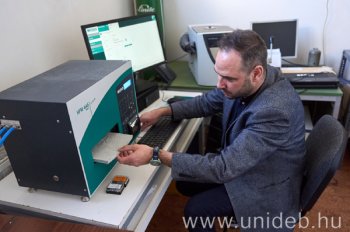
Enhancing Building Insulation with Innovative Technologies from the University of Debrecen
The pursuit of energy-efficient solutions in construction and various industrial sectors has gained momentum in recent years. Researchers at the University of Debrecen, Hungary, have made significant strides in this direction by developing advanced thermal insulation materials based on aerogel technology. These innovations promise substantial improvements in energy savings and environmental sustainability, impacting areas from residential buildings to transportation and refrigeration systems.
Understanding Aerogel Technology and Its Impact on Thermal Insulation
At the core of these innovations lies aerogel, often referred to as “solid air” due to its extremely low density and remarkable insulating properties. Composed of a solid skeleton made from materials such as silica, ceramics, or polymers filled with air or other gases within microscopic pores, aerogels are among the best thermal insulators available today. Their unique physical characteristics result in minimal heat transfer, making them ideal for applications demanding high thermal efficiency.
Research led by the Faculty of Technology at the University of Debrecen has focused on developing aerogel-based vacuum insulation sheets, which can significantly outperform traditional insulation materials. These materials can be used extensively across various sectors, including construction, automotive, healthcare, and refrigeration, to achieve substantial energy savings and reduce carbon footprints.
Innovative Approaches to Thermal Insulation: The Debrecen Research Breakthrough
The research team, led by Professor Ákos Lakatos and MSc student Ákos Szabó, explored fiber aerogels and their vacuumed forms. Their goal was to enhance the insulating properties of standard materials by removing air from within the porous structures, thereby reducing heat conduction further.
By carefully designing insulation panels containing fibrous silica-based core materials and subjecting them to vacuum treatment, the researchers observed notable improvements in thermal performance. For instance, tests showed that vacuuming microtherm and pyrogel materials reduced their thermal conductivity by over 15%, whereas spaceloft and slentex saw decreases of about 8% and 2% respectively. These results suggest that vacuum-treated aerogel composites can offer superior insulation, leading to meaningful energy savings in practical applications.
Practical Applications and Energy Savings Potential
The potential applications of these advanced materials are broad and impactful. In buildings, they can serve as supplementary insulation layers, reducing heat loss during cold months and maintaining energy efficiency throughout the year. Automotive manufacturers can incorporate such materials to improve thermal regulation in vehicles, cutting fuel consumption and emissions.
Moreover, in the healthcare sector, vacuum-insulated panels can enhance the efficiency of refrigeration units where consistent temperature control is critical. The lightweight nature of aerogel-based panels also supports their use in portable cooling systems, food preservation containers, and specialized transport boxes.
Implementing these innovations could lead to significant reductions in energy consumption, contributing to lower utility costs and a decrease in greenhouse gas emissions. The research team’s findings have been published in the prestigious journal Case Studies in Thermal Engineering, providing a valuable resource for industry stakeholders interested in adopting cutting-edge insulation solutions.
Future Directions and Educational Impact
The promising results from the University of Debrecen’s research mark just the beginning of broader application and development. The team plans to continue refining manufacturing processes for aerogel insulation panels, aiming to make them more cost-effective and easier to integrate into existing production lines.
This research also holds significant educational value. Professor Lakatos emphasizes that these innovations will increasingly be incorporated into the university’s curriculum, preparing future engineers and architects to utilize advanced materials for energy-efficient design. Additionally, MSc student Ákos Szabó’s award-winning work showcases how student-led research can lead to meaningful technological advances.
Supporting Sustainable Development through Advanced Insulation Materials
Global initiatives to combat climate change emphasize the importance of reducing energy consumption across all sectors. The University of Debrecen’s development of aerogel-based insulation aligns perfectly with these goals, offering a practical and scalable solution for sustainable development.
By investing in research and innovation, the university demonstrates Hungary’s commitment to environmental responsibility and technological progress. These advancements can inspire further collaborations with industry partners, fostering a vibrant ecosystem of sustainable materials development.
Explore Opportunities with the University of Debrecen
If you are interested in learning more about cutting-edge materials science, sustainable engineering, or pursuing advanced studies in these fields, consider exploring the programs and research initiatives at the University of Debrecen. Whether as a prospective student, researcher, or industry partner, engaging with these innovations offers a pathway to contribute to a more sustainable future.
Discover how the University of Debrecen’s expertise in thermal insulation and aerogel technologies can benefit your projects or academic pursuits. Learn more about their recent research here and see how these developments are shaping the future of energy-efficient solutions.
Conclusion: Advancing Energy Efficiency through Innovation
The work carried out by researchers at the University of Debrecen exemplifies the potential of material science and engineering to address pressing global challenges. The development of improved aerogel vacuum insulation sheets promises significant energy savings across various sectors, supporting sustainable development and environmental responsibility.
Continuing to invest in such research not only advances technological boundaries but also offers practical benefits—cost savings, reduced emissions, and enhanced comfort—contributing to a more sustainable and energy-efficient world. Stay informed about these innovations and consider how innovative insulation solutions can impact your industry or community.

